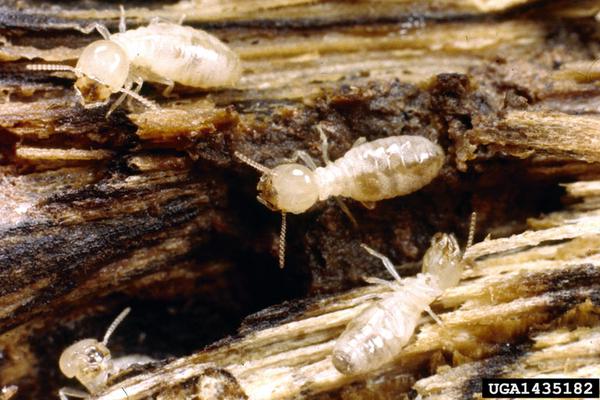Termites
go.ncsu.edu/readext?788518
en Español / em Português
El inglés es el idioma de control de esta página. En la medida en que haya algún conflicto entre la traducción al inglés y la traducción, el inglés prevalece.
Al hacer clic en el enlace de traducción se activa un servicio de traducción gratuito para convertir la página al español. Al igual que con cualquier traducción por Internet, la conversión no es sensible al contexto y puede que no traduzca el texto en su significado original. NC State Extension no garantiza la exactitud del texto traducido. Por favor, tenga en cuenta que algunas aplicaciones y/o servicios pueden no funcionar como se espera cuando se traducen.
Português
Inglês é o idioma de controle desta página. Na medida que haja algum conflito entre o texto original em Inglês e a tradução, o Inglês prevalece.
Ao clicar no link de tradução, um serviço gratuito de tradução será ativado para converter a página para o Português. Como em qualquer tradução pela internet, a conversão não é sensivel ao contexto e pode não ocorrer a tradução para o significado orginal. O serviço de Extensão da Carolina do Norte (NC State Extension) não garante a exatidão do texto traduzido. Por favor, observe que algumas funções ou serviços podem não funcionar como esperado após a tradução.
English
English is the controlling language of this page. To the extent there is any conflict between the English text and the translation, English controls.
Clicking on the translation link activates a free translation service to convert the page to Spanish. As with any Internet translation, the conversion is not context-sensitive and may not translate the text to its original meaning. NC State Extension does not guarantee the accuracy of the translated text. Please note that some applications and/or services may not function as expected when translated.
Collapse ▲
Subterranean termite workers.
Clemson University – USDA Cooperative Extension Slide Series, Bugwood
With April’s warming weather, and rain showers, we will likely be seeing an increase in termite swarming. Termite swarmers are dark in color and have wings, often being confused with flying ants.
Termites typically swarm during the daytime. They appear suddenly and may be around for several hours and then suddenly disappear.
Very often, the only sign of their activity are their shed wings scattered about the area. If swarmers are seen outdoors, take it as nature’s way of reminding you that termites live all around us. BUT, that does not mean they’re necessarily invading our homes. Consider contacting a pest management professional to inspect your home to look for any other sign of termite activity. This can be particularly helpful if your home has not been treated or inspected for more than 8-10 years. If termites swarm inside your home, then that is nature’s way of telling you that you’re likely now hosting a family of several thousand termites. If you have a termite contract, contact the pest management company immediately and arrange for an inspection.
If you don’t have a contract, it is best to contact 2-3 companies and have them inspect your home and give you an assessment of any problems and how they propose treating it. This is an instance where “do-it-yourself” is probably not a good choice. Termite treatments include the use of a liquid insecticide applied to the soil and/or the use of an in-ground termite baiting system. The choice of treatment may be a matter of your preference or dictated somewhat by the type of construction of your house (e.g., crawlspace, slab, or basement). One type of treatment is not recommended over another. The major piece of advice for you to follow – take your time and compare the treatment proposals in terms of the method of treatment, cost of the treatment, and terms of the warranty provided. Most contracts are renewed annually and come with an annual fee that varies in price based on the type of treatment you have.
Termites are not going to cause significant damage in the 7-10 days that you might use to make your decision on how best to protect your home. In many cases, the company may have to schedule you 1-2 weeks out anyway as they get busy at this time of year. If you have questions about termites, give me a call at 704-283-3729 or email at dddillio@ncsu.edu.




